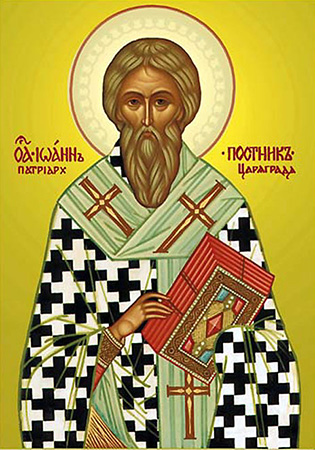Saint John the Abstainer, Patriarch of…
Saint John the Fasting Patriarch of Constantinople
Our Holy Father John was born in Constantinople in the 6th century. He worked as a goldsmith, like his father. He loved God since his youth.
Hearing of his reputation for virtue, Patriarch John III of Constantinople summoned him and ordained him a deacon at the appropriate time. He assigned him at the service of the poor.

John was loving, compassionate, and generous. While serving the poor, He would not differentiate between deserving and unworthy, but chose to be like the Heavenly Father: “His sun shines on the wicked and the righteous and rains on the righteous and unjust” (Matthew 5:45). The more plentifully he donated to others, the more generously God bequeathed his gifts to him. It even seemed as if the donation fund was inexhaustible. His love for the poor was associated with extreme austerity and asceticism.
In the year 582 AD, the Patriarch passed away and the See of Constantinople was vacant, so he was chosen as a new Patriarch. He refused at first, then he gave in and took the name John IV. The service of the new patriarch spanned thirteen years, and he was the first to be called "Ecumenical Patriarch", starting from the year 586 AD.
During his Patriarchal service, John preserved his abstinence and love for the poor; he did not change. He used to drink very little water and did not eat anything except some lettuce, watermelon, dried figs and raisins. He did not lie down to sleep, but sat with his knees bent to his chest. Hence, the Church called him "the Faster." As for his love for the poor, it was boundless. He squandered all he had on the poor. His ascetic life and love for the poor were his fence, the distinctive feature of his holiness and his service as a Patriarch. It is said that due to his large spending, he was forced, towards the end of his life, to borrow money from the emperor.
He reposed in the Lord in the year 595AD. After his death, the Emperor wanted to recover the debt from the Patriarch. When they searched his cell, they found nothing but a wooden spoon, a linen blouse, and an old cloak.
